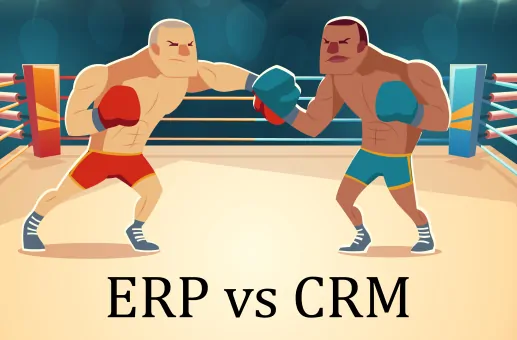The advantages of such systems cannot be denied. But what exactly are the advantages and differences between the two solutions? For which corporate structure does a CRM or an ERP offer significant added value? We have looked into these questions and found answers.
CRM handles the front end of the business, i.e. the sales and marketing operations. ERP is the implementation or production dimension of your business. i.e. Production, procurement, accounting. For small businesses, it’s usually the case that ERP will have an CRM module.
1. ERP and CRM purposes
First and foremost, both systems are intended to make everyday work easier, ensure transparency, document internal and external incidents and provide clear workflows. Nevertheless, there are significant differences. Even the approaches of the systems are different and it is not so easy to compare them. If the CRM is primarily responsible for work and communication with customers, the ERP supports the workflow in product development and implementation. A typical example of the work of CRM is recording interactions and communication with customers – administration, history, campaign management. It is about a comprehensive overview of the customer relationships and the constant exchange with the customers. Using CRM, every employee can get a good overview of every customer.
With ERP, on the other hand, the focus is not on the customer, but on the workflow behind the scenes. Workflows are regulated and coordinated via the system. Starting with goods receipt and goods issue, as these two processes involve further steps. The goods must be registered and put into storage, which is the task of an ERP system. But also production sections that have to be coordinated with each other run through it. One process can only begin when another is completed. This is coordinated by the ERP and informs the relevant persons, if this is necessary at all.
2. CRM and ERP – The Perfect Synergy
However, the systems alone are only half as efficient, especially in large companies. The simultaneous use of ERP and CRM without integration on both sides makes little sense and tends to be more expensive. This would only be a gain if the departments and systems did not have to work together. But that is hardly ever the case. It is important that ERP and CRM support each other and communicate changes so that the common database remains the same. Every new lead is created in CRM. It doesn’t matter whether a business is created from this lead or not. But if the customer converts in the end, the ERP must also learn about it and ensure that further steps are taken. For example, an invoice must then be created or the order must be put into production. If the two systems did not communicate with each other, the workflow would be interrupted and valuable time and information would be lost. In the end you have an unsatisfied customer and this should be avoided as far as possible.
In addition, there would be a double effort of data maintenance. Imagine that you run a shop and place an order by telephone. The customer is new and you create an account for them. He orders a few things and you eagerly enter this into the order list. At the end, when you are finished, you save the data in your CRM system and tell the customer that you have finished the order and send it out. You now pass the order on to the employee in charge and also give them the contact details. The employee must now enter the data into the ERP again to print the invoice, shipping label and other information. If an error occurs or one of the products requested by the customer is not in stock, you will be called by your employee and must then call the customer to discuss the changes. So you definitely have no profit from the two systems.
3. This is what you need to consider in order to make the right choice
In order to use the systems as efficiently as possible and not to create any additional work, it is important to take a close look at the market before purchasing. You must know the functions and areas of application of the IT systems and know which processes and work areas have priority in your company. Will the systems grow with my company or will this require restructuring in a year or two? How much can and do I want to spend on this?
It should also be clear that such an acquisition must be integrated professionally and correctly. It is not enough to commission a company to integrate such software. You determine how well it works in the end. You need to know exactly what your employees do. Because these are the people who will have to work with these systems afterwards. The technical infrastructure must be in place. You have to be clear about which work processes you want to specify and which ones can be managed without being integrated into such a system.
Therefore it is also useful to have a successful partnership with the software seller to look over your plans.
The generally correct CRM or ERP does not exist. You should always keep this in mind. Your task is to choose the right solution for you from the wide range of products on offer. This project requires patience, perseverance and a feeling for the needs of your company. After all, you want an individual solution adapted to your company and not off-the-shelf solution.
